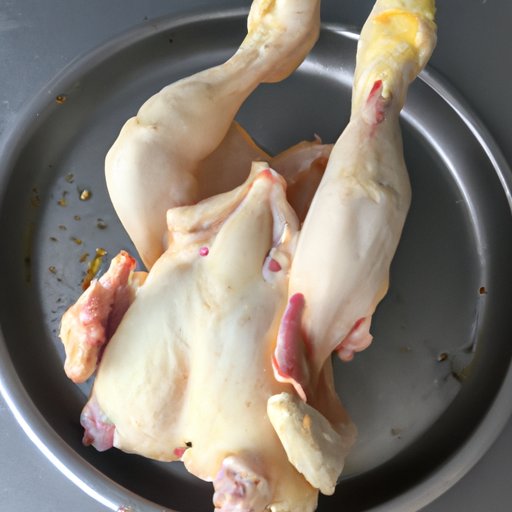
Introduction
When it comes to food safety, proper storage is crucial to prevent illness and avoid food waste. This article will explore the shelf life of chicken in the refrigerator, tips on refrigerating chicken, how to identify signs of spoilage, and the consequences of consuming expired chicken. The aim is to help readers extend the shelf life of chicken and ensure food safety in their households.
Understanding the Basics of Food Safety
Food safety refers to the measures taken to ensure that food is free from harmful pathogens and bacteria that can cause illness. Refrigeration plays a critical role in food safety as it slows the growth of harmful bacteria that cause food spoilage and illness. This is why it is necessary to refrigerate food promptly after cooking or purchasing.
The temperature of the refrigerator should be set at 40°F or below to slow down the growth of harmful bacteria. Additionally, it is important to keep raw chicken separate from other foods to prevent cross-contamination.
Discussions on the Shelf Life of Chicken
Chicken can stay fresh in the refrigerator for up to four days. To extend the shelf life of chicken, it is essential to store it properly. For instance, chicken that is vacuum-sealed can last for up to two weeks, while cooked chicken can last up to four days.
Several factors can impact the shelf life of chicken, such as temperature, air, light exposure, and storage conditions. To maximize the storage life of chicken, it is essential to refrigerate it immediately after cooking or purchasing, store it in airtight containers, and maintain the temperature of the refrigerator at 40°F or below.
When it comes to chicken, fresh chicken lasts up to two days in the refrigerator while frozen chicken can last up to a year.
Providing a Simple Guide to Refrigerating Chicken
Proper storage techniques are critical to ensuring the safety and freshness of chicken. Here are some tips for refrigerating raw, cooked, and leftover chicken:
- Store raw chicken in its original packaging, placed on a plate to prevent leaking, and separate from other foods in the refrigerator.
- Cooked chicken should be stored within two hours of cooking. Store in shallow, airtight containers to promote even cooling and prevent condensation, which can accelerate spoilage.
- Label food with the date of storage to ensure easy tracking and discard any that have been stored for over four days in the refrigerator or two days in the freezer.
- Discoloration- note any changes in appearance such as a grey or green tinge or any mold like spots.
- Odor- raw chicken should not have any smell, and cooked chicken should have a pleasant odor. A sour or ammonia-like smell is a sign that the chicken has gone bad.
- Texture- chicken should be firm to the touch, not slimy or sticky. Any change in texture, for example, is another indicator that the chicken is no longer good to eat and may cause illness if consumed.
- Chicken Salad- Mix shredded chicken with mayonnaise, mustard, and chopped celery, and serve over lettuce or in a sandwich.
- Chicken Quesadilla- Heat a tortilla over medium heat. Spread shredded chicken, shredded cheese, and vegetables on half of the tortilla and fold the other half over. Cook until the cheese melts, and the tortilla is golden brown.
- Chicken Pasta- Cook pasta with your favorite sauce. Add leftover chicken, toss, and serve with grated parmesan cheese.
Aside from proper storage techniques, organizing the refrigerator can also help extend the shelf life of chicken. Ensure that the temperature in the refrigerator is constant, with no areas experiencing unwanted temperature changes.
Identifying Signs of Spoilage
It is essential to handle and inspect chicken carefully to ensure that it is safe to eat. Here are some visual and olfactory signs that indicate chicken has gone bad:
Sharing Recipes Using Refrigerated Chicken
Refrigerated chicken can be used in various recipes, including salads, stir-fries, casseroles, and sandwiches. Here are some quick and easy recipes that incorporate leftover refrigerated chicken:
Exploring the Consequences of Consuming Expired Chicken
Eating expired chicken can result in food poisoning, which can cause severe symptoms such as diarrhea, nausea, vomiting, and fever. In severe cases, it can lead to more severe health complications, even death.
If you suspect that the chicken is spoiled, dispose of it safely and responsibly. Wrap it in plastic bags and discard it in sealed trash bins outside your home. Never attempt to cook spoiled chicken as the heat will not kill the bacteria that cause food poisoning.
Conclusion
It’s important to take food safety and proper storage seriously to prevent food waste and illness. This article has highlighted various aspects that need to be taken into account in storing chicken. By using the tips and safety measures provided, you can keep your chicken fresh and safe for consumption.
So, ensure to store chicken properly from purchase, wear gloves while handling it, extend the shelf life of chicken by refrigerating it, and dispose of chicken safely and responsibly in the case of spoilage. Share this article with friends and family to help educate them on the right way to store their chicken.




